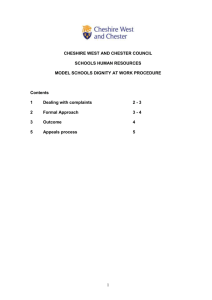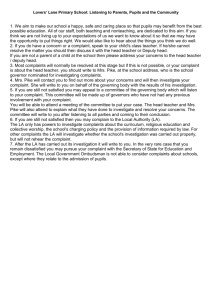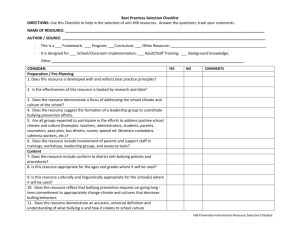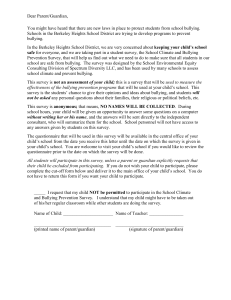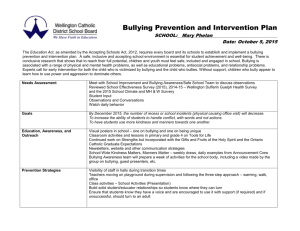Workplace Bullying and Psychological Harassment
advertisement
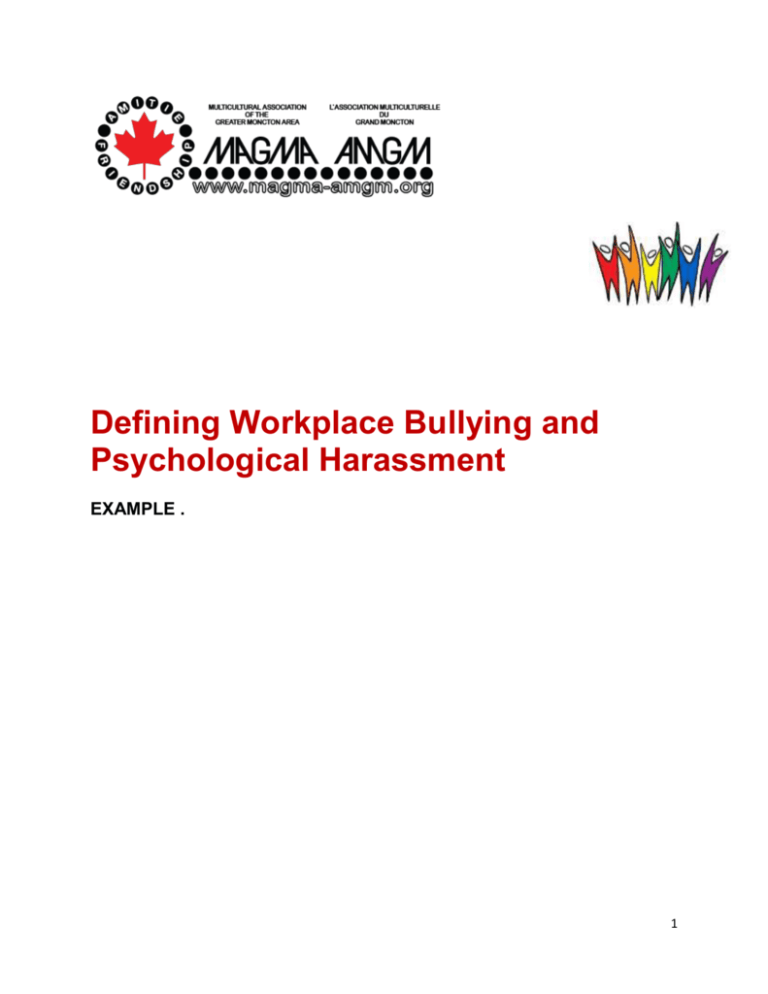
Defining Workplace Bullying and Psychological Harassment EXAMPLE . 1 Defining Workplace Bullying and Psychological Harassment Workplace bullying and psychological harassment is defined as unwanted conduct, comments, actions or gestures that affect an employee's dignity, psychological or physical health and wellbeing. Bullying and psychological harassment may result from the actions of one individual towards another, or from the behaviour of a group. Bullying and psychological harassment are often characterized through insulting, hurtful, hostile, vindictive, cruel or malicious behaviours which undermine, disrupt or negatively impact another’s ability to do his or her job and results in a harmful work environment for the employee(s). Bullying and psychological harassment can take many forms and may occur when the behaviour or conduct: o would reasonably tend to cause offense, discomfort, humiliation or embarrassment to another person or group; o has the purpose or effect of interfering with a person’s work performance; o creates an intimidating, threatening, hostile or offensive work environment What Is Workplace Bullying? (Video Presentation). Workplace Bullying Made Simple: Bullying Prevention for the Workplace. Bully is hostile, aggressive or unreasonable behaviour perpetrated against a co-worker. Bullies use these behaviours simply to embarrass and humiliate or to expand their power and influence. Bullying can be peer-to-peer or it can be perpetrated by managers or supervisors who take advantage of their positions of power. Bully can be physical, verbal, non-verbal or psychological. It can occur face-to-face-, on the phone or online and be perpetrated by groups of employees or by individuals. Examples: 2 The Following behaviours are considered workplace bullying and not tolerated in any organization. The use of inappropriate language, put downs, Insults and name calling. Taunting, teasing or making jokes about co-worker when the intent to embarrass and humiliate. Sabotaging another employee’s work or copying, plagiarizing or stealing work from a co worker and passing it off as your own Deliberately isolating or excluding a co-worker from work related activities. Yelling, screaming, sarcasm, or other verbal abuse with the intent to threaten, immediate or humiliate. Menacing a co-worker with threatening looks, gestures and body language. Hazing or initiations that seeks physically or psychologically embarrass or humiliate a new co worker. Unreasonably creating conflict of refusing to work with a co-worker. Physically threatening, shoving, striking or touching a co-worker in an intimidating or inappropriate manner. Gossiping or spreading rumours about co-workers Including the placing of false information or using private or confidential information to defame or destroy the reputation of a coworker. Setting unrealistic standards and deadlines which are unachievable or that arbitrarily changed without notice or reason. Giving excessive unreasonable and unending amounts of work to subordinate employee. Deliberately denying co-workers the resources necessary to do their job effectively. Ignoring , ridiculing or betting a co-workers contribution or 3 deliberately failing to acknowledge his or her good work. Giving unjust negative performance appraisals or taking unwarranted disciplinary action. Singing out or treating co-worker differently or holding a subordinate employee to different standards than his or her peers. Excessive unneeded and negative micromanagement that undermines an employee’s ability to do his or her job effectively. Work place bullying has consequences. Because of the devastating impact that bully has on a company’s creativity, productivity and moral, there can be severe consequences for engaging in it. It can result in disciplinary action including written warnings, suspension, demotion and even termination. In addition, retaliation for a bullying complaints is strictly prohibited and could result in disciplinary actions up and including termination. How can you stop workplace bullying it’s simple. 1. Treat co-workers with respect. 2. Treat co- worker fairly and equally. 3. Speak up when you witness bullying. Any witness or victim of workplace bullying should report the conduct to management or human resources. The best way to eliminate bullying in the workplace is to remember the “golden rule”- treat co-workers exactly like you would like to be treated- with dignity, respect, fairness and equality. After all, all employees deserve a workplace where they can do their jobs to the best of their abilities- a workplace fear and full of respect (This concludes the Video Presentation.) 4 For example, bullying would not include: • the normal exercise of supervisory responsibilities, including performance reviews, direction, counseling and disciplinary action where necessary, provided they are conducted in a respectful, professional manner, in accordance with (insert name of workplace) polices and procedures. • social interactions, jokes and bantering, which are mutually acceptable, provided the interactions are respectful and there is no negative impact for others in the work environment. • disagreements, misunderstandings, miscommunication and/or conflict situations, provided the behaviour of the individuals involved remains professional and respectful Any witness or victim of workplace bullying should report the conduct to management or human resources. Employees’ Rights, Roles and Responsibilities Each and every employee of the organization is expected to support the implementation of this policy by: • conducting themselves in a manner which demonstrates professional conduct, mutual respect for others and which honours diversity in the workplace. • participating fully and in good faith, in any resolution process or formal complaint and investigation process where they have been identified as having potentially relevant information • reporting any incidents which may be in violation of this policy • respecting the rights to personal dignity, privacy and confidentiality pertaining to this policy Management Roles and Responsibilities While every employee is responsible for maintaining and contributing to an environment that is free from bullying, those in positions of authority over staff carry more responsibility than other employees within our organization. Management personnel have additional obligation to make every reasonable effort to establish and maintain a workplace free of bullying and psychological harassment. Related to this policy, their responsibilities include: • acting as a role model for professional and respectful conduct • ensuring employees have full access to information regarding employer policies and standards • intervening immediately when inappropriate conduct has been brought to their attention or has been observed • notifying police when there are reasonable grounds to believe that a violation of the Criminal Code has occurred • respecting the rights of all parties to a fair, equitable and confidential process for responding to complaints • support to all those who participate in a problem-solving process • enforcement of corrective and/or disciplinary measures, where applicable 5 To assist dialogue and clarification of the facts in each situation, employees are encouraged to document the details regarding unwanted behaviour. As soon as possible, make a record of the details of each incident, including the time, dates, names of those who were present, if any, and circumstances surrounding the incident. Record also if you have spoken directly to the individual about the unwanted behaviour, details of the dialogue and the individual’s response. Specific information related to the unwanted conduct is helpful to each of the resolution processes. In considering options, or to obtain additional information you may: • speak directly with your manager • contact the Human Resources Unit, which is available to all employees for confidential To Initiate a Formal Complaint: To initiate a formal complaint and investigation process, the employee must provide a written complaint to the direct manager or HR dept of MAGMA, or designate. In the event that the allegation(s) may involve the name of direct manager, the complaint would be submitted in writing directly to the HR dept of MAGMA. The letter of complaint should include the name of alleged perpetrator(s); allegations of bullying citing specific incidents including dates, times, places; description of any efforts previously undertaken to resolve the concerns, where applicable and the results. The alleged perpetrators are considered respondent(s) to the complaint. Upon receipt of the complaint, the MAGMA, or designate, may conduct a preliminary information gathering and assessment, to determine if the matter falls under the scope of this policy and to determine if a formal investigation is the appropriate avenue to address the complaint. In keeping with this policy, for matters under its scope, a thorough fact-finding investigation will be conducted in a timely and unbiased manner. Time frames for each step of the investigation process are included in the following sections. A summation of the potential time line for a formal investigation is also included in the Appendix. • When a Formal Investigation May Not Proceed: MAGMA , or designate, may decide not to proceed with an investigation process: a) If there is no indication that the allegations would fall under the scope of this policy, i.e. allegations are not related in any manner to conduct that may be considered bullying, as outlined within the definitions; or b) If a significant delay has occurred between the alleged event(s) and the filing of a complaint, which would reasonably preclude the feasibility of a sound investigation process, and/or of appropriate restorative or corrective measures. For the purpose of this policy, in the absence of an appropriate reason, a delay in excess of 6 months would be considered significant. Where deemed appropriate to the circumstances of a formal complaint, MAGMA may utilize mediation, if the complainant and respondent are both willing to engage in a mediation process, in order to reach settlement of the complaint 6 If agreement has been reached through mediation, a resolution agreement shall be submitted in writing to the MAGMA, or designate, within 15 working days of the mediation being completed. The resolution agreement is to be signed by each of the parties involved in the mediation. Each party will also retain a copy of the agreement. The Formal Investigation Process: Upon receipt of a letter of complaint, the Regional Director, or designate, will inform the person(s) named in the complaint of the allegations within 5 working days, or as soon as practicable, if circumstances prevent notification within the 5 day period. The person(s) named in the complaint will be considered as the respondent(s). The respondent(s) shall have the opportunity to file a written response to the complaint, which must be filed with the HR Dept/Regional Director within 10 working days of being informed, unless this time frame has been extended by management, based on extenuating circumstances. Should the respondent(s) provide a written response, the complainant(s) will be informed of the response within 5 working days of its receipt, or as soon as practicable, if circumstances prevent notification within the 5 day period. An investigator will be assigned by the HRdept/Regional Director, or designate, within 10 working days of management’s decision that a complaint will be investigated, unless circumstances dictate otherwise. The investigation must be completed and final report submitted to the Regional Director, or designate, within 60 working days of assigning the complaint to an investigator, unless there are extenuating circumstances. The investigator will also provide a written summation regarding their findings and conclusions to the complainant(s) and respondent(s) within the same time frame. The complainant(s) and respondent(s) will have the right to reply to the findings of the investigation within 7 working days of receipt of the summary report. Written responses are to be submitted directly to the Regional Director, or designate. No actions will be taken by the Regional Director, or designate, within the 7 working days in which both parties have a right to reply. Based on the factual findings and results of the investigation, and any additional information contained in written responses to the investigation summary report, the Regional Director, or designate, shall determine what actions are to be taken as a result of the findings. A complainant does retain the right to withdraw their complaint, should he/she no longer wish to proceed with a formal investigation. Should a complainant decide to withdraw his/her complaint, he/she must notify the Regional Director, or designate, in writing. MAGMA may be required however, to continue its investigation, where there are indicators that bullying may have occurred. Investigation Procedures: 7 The investigator will first conduct individual interviews with the complainant(s) and respondent(s) so that each person will have full opportunity to provide information. related to the allegations. If a respondent refuses to participate in the investigation, the formal fact-finding process will continue nonetheless. Any individuals who have been witness to events, or who may be able to provide information directly relevant to the investigation, will also be interviewed. Union members can elect to have a union representative of their choosing in attendance during investigation interviews Once all of the relevant information is gathered, the investigator will submit a confidential report to the Regional Director, or designate. As stated under the investigation process, the investigator will also provide a written summation regarding their findings and conclusions to the complainant(s) and respondent(s) within the same time frame. Interim Measures Where required to ensure the safety and well-being of the complainant(s) and/or respondent(s), the MAGMA may implement interim measures pending the investigation and disposition of a formal complaint. Interim measures are not disciplinary and may take different forms, as applicable to the situation, including but not limited to: • Interim conditions or restrictions upon work related activities, including restricting of contact and/or communication between involved parties • Temporary re-assignment of duties or work-related activities • Suspension of work related activities, with pay and without disciplinary penalty • Interim security measures Possible Outcomes of an Investigation A formal investigation involves a thorough information gathering process, objective analysis, determination of fact and conclusions regarding the allegations made in the complaint. The investigation may conclude with a finding of bullying; or it may conclude that that there is an insufficient basis of information to support a finding of bullying, dependant upon the facts and analysis of information. Where anyone is found responsible for workplace bullying, corrective measures will be taken. Corrective measures may include, but are not limited to: o Counselling o Education and training o Formal written apology o Warning o Change of work assignment o Disciplinary action, in accordance with this policy and the collective agreement, up to and including dismissal. If, as a result of the findings, disciplinary action is taken, this shall be noted on the employee’s 8 personnel file subject to any provisions in collective agreements, where applicable, or as required by law. Time Frames for Filing a Complaint In setting parameters for the complaint process, MAGMA adopts the time frame that complaints should be filed within six months following an alleged occurrence. MAGMA may extend this time limit, however, under circumstances where there is an appropriate reason for the delay, where the delay was incurred in good faith and where no substantial prejudice will result to any person affected by the delay. Confidentiality and Privacy Confidentiality is beneficial to everyone involved, whether resolution is being sought through direct dialogue, informal resolution or a formal complaint process. It allows the parties to resolve issues in a private manner and protects them against unsubstantiated claims that might result in harmful gossip. Every participant in this process is expected to maintain confidentiality throughout the process and thereafter. Only those who must be informed of the details will be involved, in order to effectively address the situation. To protect the interests of all parties involved, all information must remain confidential, subject to the rules listed below, and except where sharing of information is otherwise required by law, collective agreement and/or with respect to a possible violation of the Criminal Code. • Complainants, respondents and witnesses will have access to their own statements • Respondents and complainants must have sufficient information about the allegations and response of the other parties to enable them to offer rebuttal. • There must be no reference to a complaint under this policy in an employee’s personnel file, unless disciplinary action was taken against the employee. How to Respond If Allegations of Bullying are Made Against You If allegations are made against you, listen to the concerns of the other party. If your behaviour is inappropriate, cease the unwelcome behaviour and offer an apology to the person(s) affected by your conduct. If you believe that the allegations are unfounded, discuss the matter with your manager, Human Resources Advisor or union representative, as may be appropriate to the situation. Review the this policy, including your rights within the process, and discuss your options in responding to the situation. If a third party facilitator or investigator is involved, provide them with information that is factual and specific regarding your response to the allegations. It is helpful to document your version of alleged incidents, detailing the names of the individual(s) involved, when and where incidents may have occurred, noting any witnesses, if applicable. 9 Knowing that such situations are stressful for all those involved, do not discuss the matter with others at work, including those who may have witnessed events. Maintain a confidential and professional approach to the situation. Remember that allegations may not be substantiated. MAGMA is committed to ensuring that each party has full opportunity to present their side and that the rights and dignity of all parties are respected in the process. Other Considerations: Protection from Reprisals or Retaliation Retaliation or reprisals against anyone involved in a resolution process through this policy will not be tolerated. Any actions of retaliation or reprisal may result in disciplinary action. Protection from reprisal covers both complainants and witnesses who have participated in the policy process. Also protected from reprisal are third party resources, representatives, investigators and management responsible for decision-making functions within this process, acting in accordance with this policy. What Happens if Someone Fabricates a Complaint? Because of the serious nature of a complaint, false accusations or abuse of this policy will not be tolerated. Where a formal investigation concludes that a complaint was knowingly frivolous or malicious and was filed in bad faith, disciplinary action will result, up to and including dismissal of employment from MAGMA. The Employer acknowledges that this policy contained herein have been reviewed with the Employee. The Employee hereby understands the policy of Workplace Bullying and Psychological Harassment. I have read, understand and hereby voluntarily accept this policy update. ………………………………… Employee Name (printed) ……………………………… Employee Signature …………………..………… Date 10 11

